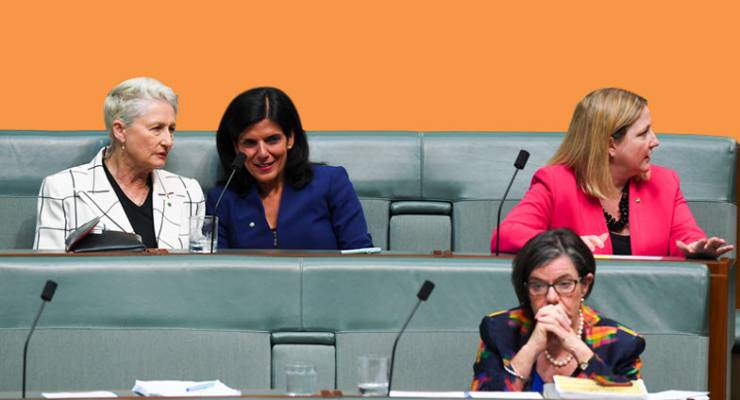
Scott Morrison’s ongoing attempts to take some of the sting out of the asylum seeker debate continue. While quibbling over the details, the Prime Minister has conceded a key demand in Kerryn Phelps’ Migration Amendment (Urgent Medical Treatment) Bill, which would allow an independent panel of doctors to review Home Affairs’ decisions over asylum seeker medivacs.
This shows the government is seriously considering the prospect of a potentially historic loss in parliament next week; a loss that could trigger a vote of no-confidence and a snap election. It goes without saying that the crossbenchers’ decisions could be hugely consequential. But where exactly do they stand?
Cathy McGowan
McGowan, who is retiring at the coming election, seems to be the government’s best bet of getting an independent to break ranks and oppose the bill. She has been non-committal about the bill, repeatedly saying she will reserve her judgement until it comes to the vote. Tellingly, she has asked her constituents what they think she should do.
Kerryn Phelps
The architect of government woes (in more ways than one), Phelps has today labelled Morrison’s concession as “a recognition that the system is broken”. She told Fran Kelly on ABC RN that it was “very important” that the government has proposed the involvement of medical practitioners, but said “it’s not going to solve the problem because we still have bureaucrats making the decision”. “[We need to] take medical decisions out of the hands of bureaucrats and politicians — with appropriate ministerial oversight on national security grounds”.
Phelps has taken a similar view on yesterday’s news about the remaining children on Nauru preparing to leave for the US — saying it was “absolutely fantastic” — but it was “nowhere near enough”. She noted the “dire reports” about mental health issues afflicting the hundreds of people still on Manus and Nauru — indeed, it’s been reported that suicide attempts are a daily occurrence on Manus.
Andrew Wilkie
Wilkie previously introduced the Refugee Protection Bill — aimed at a more long-term solution to Australia’s asylum seeker problems, which was seconded by McGowan — before the issue of urgent medical evacuations pulled focus. He supports (and co-sponsored) the bill.
Bob Katter
Katter is the only crossbencher to unequivocally say he won’t support the bill, based on his demonstrably incorrect assertion that “these people are not refugees”. He told Sky last year:
If you leave a country on this side of the globe and go right around the globe to this side of the globe, get past 20 countries in the process, you are not a refugee — you’re not fleeing from, you are going to. They are choosing the country they want to go to.
Julia Banks
Newly minted crossbencher Julia Banks has long been both a private and public critic of the government’s asylum seeker policy. Days before she quit the Liberals, she gave a speech criticising both sides for “playing politics” on the issue. She has, along with Wilkie, co-sponsored Phelps’ bill, as have the remainder of the crossbench, Greens’ Adam Bandt and Centre Alliance’s Rebekha Sharkie. Phelps said today that she had not gotten any sense that Banks’ support on the crossbench had faded.
Even with the whole crossbench and Labor on board, Phelps needs the support of at least one government MP to get her legislation through the lower house. Labor, despite completely dropping the ball last year, support the bill.
Given Katter’s stated position, Phelps might need two government MPs. Either way, it may be worth keeping an eye on Banks’ ally Craig Laundy, who may have no future in the Liberal Party to protect, and long-term Liberal Party refugee advocate Russell Broadbent.








Katter is the only crossbencher to unequivocally say he won’t support the bill, based on his demonstrably incorrect assertion that “these people are not refugees”.
No surprise there that Katter is wrong. I suspect he breaths out more often than he breaths in.
Peter…technically Katter is correct. The Refugee convention says that refugees fleeing their homeland for safety reasons must apply to the FIRST country they reach that has signed the convention (they should accept refugees once they have done that). Now I have no idea how many of them have ‘bypassed’ such countries in their journey to Australia, but surely there must be some.
I would like to add that I usually NEVER agree with anything Katter has to say, and think he is probably dead wrong about most of these people NOT being refugees. However, if that is the case, they should still apply to the first country, that has signed the convention, they reach outside their homeland. Otherwise they risk being labelled as asylum seeker ‘shopping’!
That is just logical in my book.
Really, care to point us to the bit that says it has to be the very first Country? Pretty sure that countries need to be signatories to the Human Rights Convention.
“Tellingly, she has asked her constituents what they think she should do. ”
Damn, a democratically elected parliamentarian actually consulting the people she represents when representing them.
Yes but how do we know who McGowan spoke to, how many she spoke to, how representative of the electorate they were. Sounds like weasel words to enable her to perform the mental gymnastics to vote with the Libs.
Morrison, cunning as a shithouse rat, knows how to divide and conquer. At least one of the “independents” will fold and the fear of God and deselection threats to his own side will shore up the rest. Business as usual.
With only 7 ‘working’ days planned for this parliament prior the Budget & calling an election, this attempt may be irrelevant.
However, anyone imagining that ‘Labor’, should it fall into office, will remain so committed to decency should remember the last couple of annual conferences.
I wonder if Julia “Newstart” Banks reckons she could keep a family of 4 refugees on $40/day?